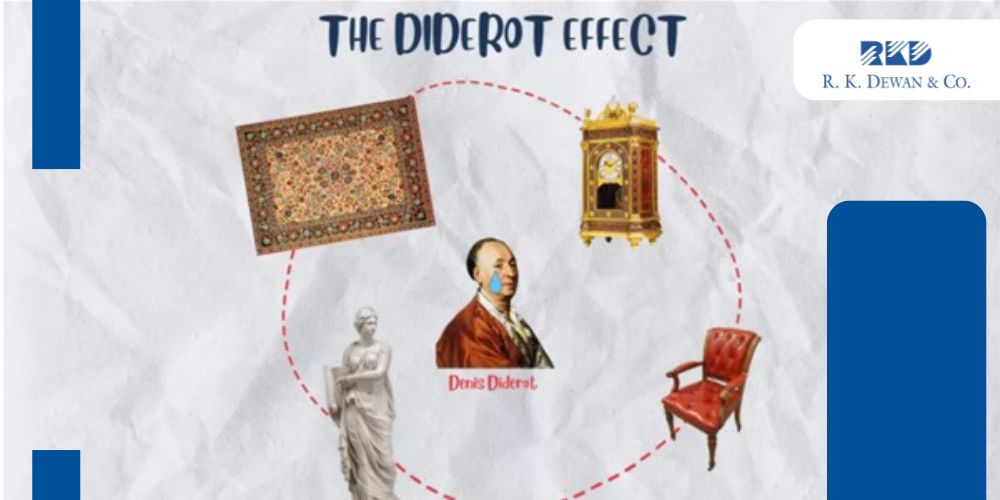Have you ever bought a new phone, only to find yourself browsing for cases, chargers, headphones, and maybe even a portable speaker – all within a few days? If so, you’ve experienced the Diderot Effect in action.
A Royal Upheaval and the Birth of an Idea
The Diderot Effect isn’t a recent phenomenon; it has roots tracing back to the 18th century. The man behind the concept is Denis Diderot, a brilliant French philosopher. Unlike the portrayal of him being too poor to afford his daughter’s dowry, Diderot’s financial struggles stemmed from a different source. Despite his intellectual prowess, exemplified by his work on the monumental “Encyclopédie,” Diderot faced financial hardships.
His situation came to the attention of Catherine the Great, the Empress of Russia, who was a patron of the arts and sciences. Learning of Diderot’s plight, she offered him a substantial sum to purchase his personal library. With newfound financial security, having settled his daughter’s dowry and still left with a substantial sum, Diderot decided to indulge in a personal luxury – a stunning scarlet dressing gown.
This seemingly simple purchase, however, triggered a cascade of unintended consequences. The luxurious robe clashed with the rest of Diderot’s modest belongings. In an attempt to restore a sense of harmony and elevate his surroundings to match the grandeur of the robe, Diderot embarked on a series of unplanned acquisitions. He bought a beautiful rug from Damascus, exquisite sculptures, and even a fancy mirror. These purchases, which he never considered necessary before, were all fuelled by the desire to create a cohesive aesthetic around his prized possession. It is accurate here to say that while he was the owner of his previous gown, but he became a slave of his new one.
This very experience of acquiring a new item that disrupts the harmony of existing possessions and leads to a series of unplanned purchases to restore balance is what we now call the Diderot Effect.
The Psychology Behind the Purchase Frenzy
So, why does this happen? The Diderot Effect taps into several psychological factors:
- Perception of Incompatibility:When we acquire something new, it can clash with the aesthetic or functional qualities of our existing possessions. This perceived incompatibility creates a desire to upgrade other items to achieve a sense of coherence.
- Social Comparison:We’re wired to compare ourselves to others( keeping up with the Joneses). A shiny new phone might make our older model feel outdated, especially if we see friends and family using the latest technology.
- Escalation of Commitment:Once we’ve made a significant purchase, we may feel a need to justify the expense by investing further in related items. This can lead to a snowball effect of spending.
The Diderot Effect in Action: A Day in the Life of an Indian Consumer
Let’s see how the Diderot Effect plays out in everyday Indian life:
- You buy a new, stylish saree for a wedding. Suddenly, your existing blouses seem dull, and you find yourself shopping for new ones to complement the saree.
- You purchase a top-of-the-line coffee maker. Now, your old mugs feel inadequate, leading you to browse for a matching set.
- You invest in a new cricket bat. Next thing you know, you’re considering new pads, gloves, and perhaps even a kit bag to complete the look.
Businesses and the Art of Upselling and Cross-selling
Businesses are well aware of the Diderot Effect and actively leverage it to boost sales. Here are some common tactics:
- Product Bundles:Offering phone cases, chargers, and screen protectors bundled with a new phone creates a sense of value and encourages additional spending.
- Strategic Placement:Placing phone accessories near the checkout counter or showcasing designer handbags next to shoes caters to the impulse to create a cohesive set.
- Complementary Products:Highlighting items that pair well with a new purchase, like suggesting a new watch strap for a recently bought watch, can trigger the Diderot Effect.
- Limited-Time Offers:Discounts on accessories alongside a new phone purchase create a sense of urgency and encourage impulse buying.
The Ethical Responsibility of Businesses
While the Diderot Effect can be a powerful marketing tool, ethical considerations are crucial. Businesses should strive to:
- Offer genuine value: Promote products that genuinely enhance the user experience, not just create a perceived need.
- Provide transparent pricing: Clear pricing structures prevent customers from feeling pressured into unplanned purchases.
- Promote informed buying: Educate customers about the Diderot Effect and encourage them to make well-considered choices.
By understanding the Diderot Effect and its impact on consumer behavior, both individuals and businesses can navigate purchases more consciously. Consumers can avoid unnecessary spending sprees, while businesses can promote responsible buying habits while still fostering customer satisfaction and loyalty.



No comment